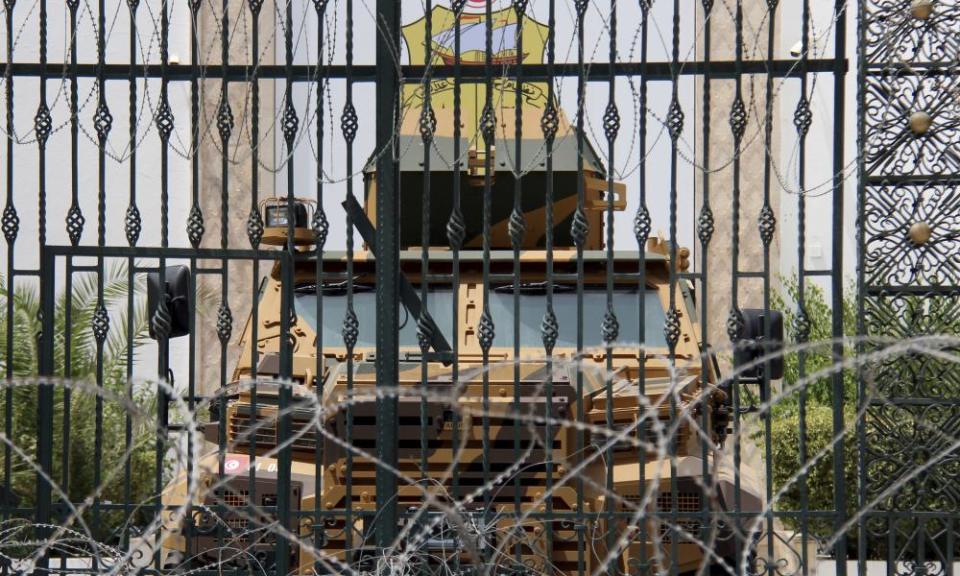What is going on in Tunisia? All you need to know

Ten years after the revolution that triggered the Arab spring, Tunisia, long regarded as one of the few democratic transition success stories to come out of that era, has been plunged into crisis after its president, Kais Saied, suspended parliament and lifted the immunity of politicians for 30 days, citing a provision in Tunisia’s 2014 post-revolution constitution.
That has prompted accusations from Ennahda, often described as a moderate Islamist party, that Saied has staged a coup.
So what’s going on?
The crisis is the culmination of two converging sets of events, one more recent and the other more long-lasting.
Related: Tunisia’s president imposes month-long curfew and bans gatherings
Since his election in a landslide in 2019, Saied, a dour law professor and social conservative who campaigned as an outsider, has been locked in a struggle with Tunisia’s parliament – with the Ennahda party prominent within it – over the country’s post-revolution separation of powers.
Under Tunisia’s 2014 constitution, political power is supposed to be divided between the institutions of the presidency and parliament with disputes adjudicated by a constitutional court.
That court, however, has never sat because of disagreements over appointments and because Saied refused to ratify the bill parliament passed to establish the court. These tensions echo wider political wrangling over key ministerial appointments that have led to deadlock, not least in the midst of a pandemic.
In a country with the worst coronavirus crisis in Africa and amid widespread anger over the bungled handling of the vaccination roll-out, Saied ordered the army to take charge of the response to the health crisis last week before his latest moves.
How similar is this to the toppling of the Muslim Brotherhood in Egypt in 2013?
While it looks similar at first glance, a lot of factors are very different.
Related: Powerbrokers of Arab world will be closely watching Tunisia
Egypt’s Abdel Fatah al-Sisi was defence minister and had strong support in the army when he launched his coup, but Saied is a civilian, albeit with responsibility for the security services as president.
With a base far less organised than those of parties such as Ennahda and Nidaa Tounis, he would need to rely on the army and police to enforce a coup, and their position remains unclear.
The nature of the competition is also more complicated. Rather than a straight struggle between a secular figure backed by the military and an Islamist movement, Saied and Ennahda are in competition for the same supporters, not least young rural social conservatives.
All this has occurred amid discontent among voters over the state of the economy and a long-running identity crisis within Ennahda, which left behind its role as a more conventional Islamist movement in favour of being a more conventional political party.

That has left Saied as sometimes more outspoken than Ennahda on some hot-button issues for social conservatives – such as opposition to gay rights and women’s inheritance equality. Saied also supports the death penalty and has said he is opposed to normalising relations with Israel.
What’s Saied’s view of democracy?
Saied campaigned in 2019 against corruption and in favour of a complicated form of direct democracy at the local level, which critics saw as intended to bypass the current arrangements for the election of MPs. He has also campaigned to allow voters to recall politicians accused of financial or “moral” corruption.
He gained prominence as an academic legal expert on the country’s constitution, but most outside observers see his invocation of article 80, which allows the suspension of parliament in extraordinary circumstances, as flawed because he failed to consult parliament and its speaker, Rachid Ghannouchi, Ennahda’s most prominent leader.
Related: Tunisia’s political crisis greeted with indifference on streets of capital
Why have we not seen the same kind of street protests as during the Arab Spring so far?
Saied’s landslide victory in the run-off of the 2019 presidential election saw him gain widespread support from young Tunisians. His support has declined since then, but for now he remains the most popular politician or political party in Tunisia by quite a wide margin.
What happens next?
Saied claims to be bound by the constitution, so the test will be how closely he cleaves to it with article 80, which he invoked, allowing for a 30-day suspension of parliament.
Ennahda has also asked its supporters to avoid escalating the situation on the streets in line with its generally pragmatic approach in recent years, in which it has attempted to avoid confrontations, acutely aware of what happened to the Muslim Brotherhood in Egypt.
Unlike those of some of its neighbours, Tunisia’s civil society – including organisations such as the influential UGTT national trade union – is better developed and expected to play a role in any dialogue in the coming weeks.
Another key test will be if Saied appoints a prime minister, and if so whom, and how widely that move is supported.

 Yahoo Finance
Yahoo Finance 